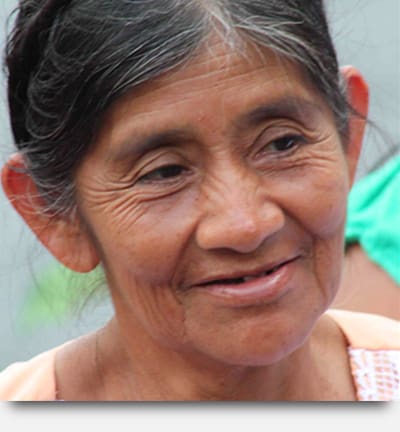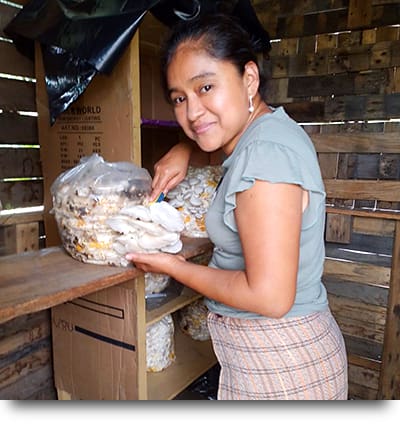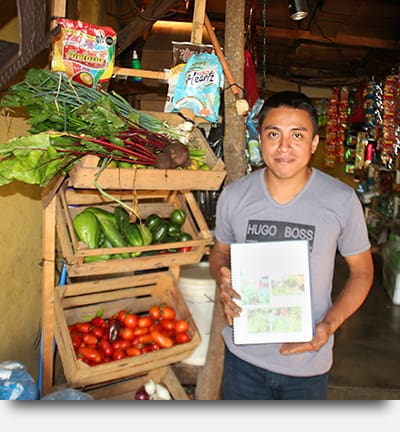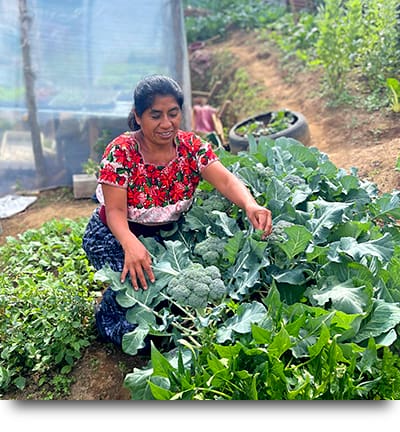Disfruta de este vídeo con Florentina, participante en el Programa Semillas, en el que describe el cultivo de setas para una microempresa de éxito.
Creación de microempresas
Las oportunidades económicas en la Guatemala rural no siempre llegan fácilmente, pero las familias están creando las suyas propias.
Tras adquirir conocimientos de jardinería y nutrición sostenibles, muchos dan el siguiente paso: crean microempresas que generan nuevas oportunidades de ingresos y fortalecen a sus familias y comunidades.
El aumento de los ingresos permite una vida más próspera y, al mismo tiempo, que las personas permanezcan en su entorno y no emigren a ciudades u otros países para mantener a sus familias.
Crear microempresas para las familias rurales familias y comunidades rurales
A continuación se presentan ejemplos de cómo los participantes en el Programa incorporan microempresas a sus vidas, creando la oportunidad de vivir mejor con nuevas oportunidades de ingresos y una mayor autosuficiencia.

Venta de bebidas de cacao artesanales
Desde el principio de nuestro trabajo en Chocolá, Doña Dominga ha participado con dedicación.
El Programa Semilla de Futuro tiene una duración de 12 meses de formación y tutoría, pero Doña Dominga es especial: una participante emérita en el programa de microempresas.
Es una fuente de inspiración para las nuevas familias de muchas maneras, por ejemplo, dejando que Seeds utilice su granja como centro de demostración para las jornadas de campo y compartiendo nuevos métodos de propagación de plantas que ha desarrollado a partir de su propia experiencia y conocimientos.
Animada por nuestro equipo de campo, diversificó su cafetal para incluir el cacao. Ahora es conocida por las tabletas artesanales de cacao, azúcar y canela que vende para preparar una sabrosa y popular bebida de chocolate caliente.
A medida que sus árboles de cacao maduraban y producían más granos, los extensionistas de Semillas para el Futuro ayudaron a Doña Dominga a construir una instalación de secado de bajo coste y baja tecnología para procesar el creciente suministro de materia prima.
La instalación de secado le ha permitido ampliar su microempresa al tiempo que alquila la estación de secado a otros cultivadores de cacao, una fuente adicional de ingresos para nuestra Estrella mayor.

Setas ostra - Deliciosas y nutritivas
Con una buena formación, las setas ostra son fáciles de cultivar y bastante prolíficas.
Una de sus ventajas es que no ocupan espacio en el jardín. Se cultivan en bolsas, al abrigo de la luz solar y la lluvia. Muchos empresarios de setas cuelgan las bolsas en el interior, incluso debajo de una mesa, si el espacio es un problema.
Muchas mujeres participantes han puesto en marcha con éxito microempresas cultivando setas para venderlas a sus vecinos. Hay un mercado preparado, ya que las setas son muy apreciadas para muchos platos populares y pueden ser caras o no estar disponibles en los mercados locales.

Venta de productos nutritivos en los barrios de Chocolá
Los nuevos participantes en el Programa en la zona de Chocola expresaron su interés en criar suficientes plantas alimenticias para venderlas en calidad de microempresa.
A menudo, los participantes ya tenían una clientela preparada a través de una pequeña tienda informal que formaba parte de su casa.
Los miembros del equipo de campo de Seeds ayudaron a estas familias a planificar la distribución de sus tierras para obtener la máxima producción, utilizando el formato de mandala de alta producción siempre que fue posible. Nuestro asesoramiento a las microempresas incluyó mejoras en el funcionamiento general de su tienda doméstica.
Estas situaciones son ideales para los microempresarios del barrio. Pueden cultivar muchas plantas solicitadas y ofrecerlas sin el tiempo y el coste adicionales de un taxi hasta el mercado.
Las plantas vendidas siempre serán más frescas que las del mercado, ya que cada manojo se cosecha justo cuando el cliente está listo para comprar.
Para estos empresarios florecen plantas locales populares y nutritivas, como las hojas de mostaza, el chipilín, la hierba mora y el quilete.

Aumentar la variedad de alimentos vegetales para vender en los mercados locales
Recientemente llevamos a cabo un Programa de Extensión Agrícola en El Pilar, Democracia. Aquí las familias tienen parcelas más grandes que en muchas otras zonas, y los participantes estaban entusiasmados por aprender sobre cultivos comercializables.
Se probó el éxito de varias plantas alimenticias que no se cultivaban antes en la zona. Pepinos, chiles jalapeños, pimientos, tomates, hojas de mostaza, acelgas y otras plantas deseables y nutritivas resultaron muy adecuadas.
Las mujeres de las 20 familias participantes formaron la Asociación Comunitaria de El Pilar como microempresa para criar y comercializar los nuevos cultivos y compartir los resultados.
La Asociación decidió utilizar los ingresos de la cosecha inicial para comprar más instrumentos agrícolas, como azadas, rastrillos y cordeles, para apoyar las plantas y las semillas. Una parte compró vallas para una zona que GIRASOL utilizará como huerto de demostración mientras proporciona alimentos a los miembros de la comunidad. El resto se distribuyó entre las familias de la Asociación.
La información y el asesoramiento en El Pilar también se centraron en los árboles frutales como fuente de ingresos, además de proporcionar la nutrición familiar. Varias familias están llevando sus actividades de cría de cerdos al nivel de microempresa.
Sigamos conectados
Reciba nuestras últimas noticias y actualizaciones sobre cómo recuperar la nutrición y la salud, el impacto del cambio sostenible y el poder de la autosuficiencia en las comunidades rurales.
Nuestros socios:







